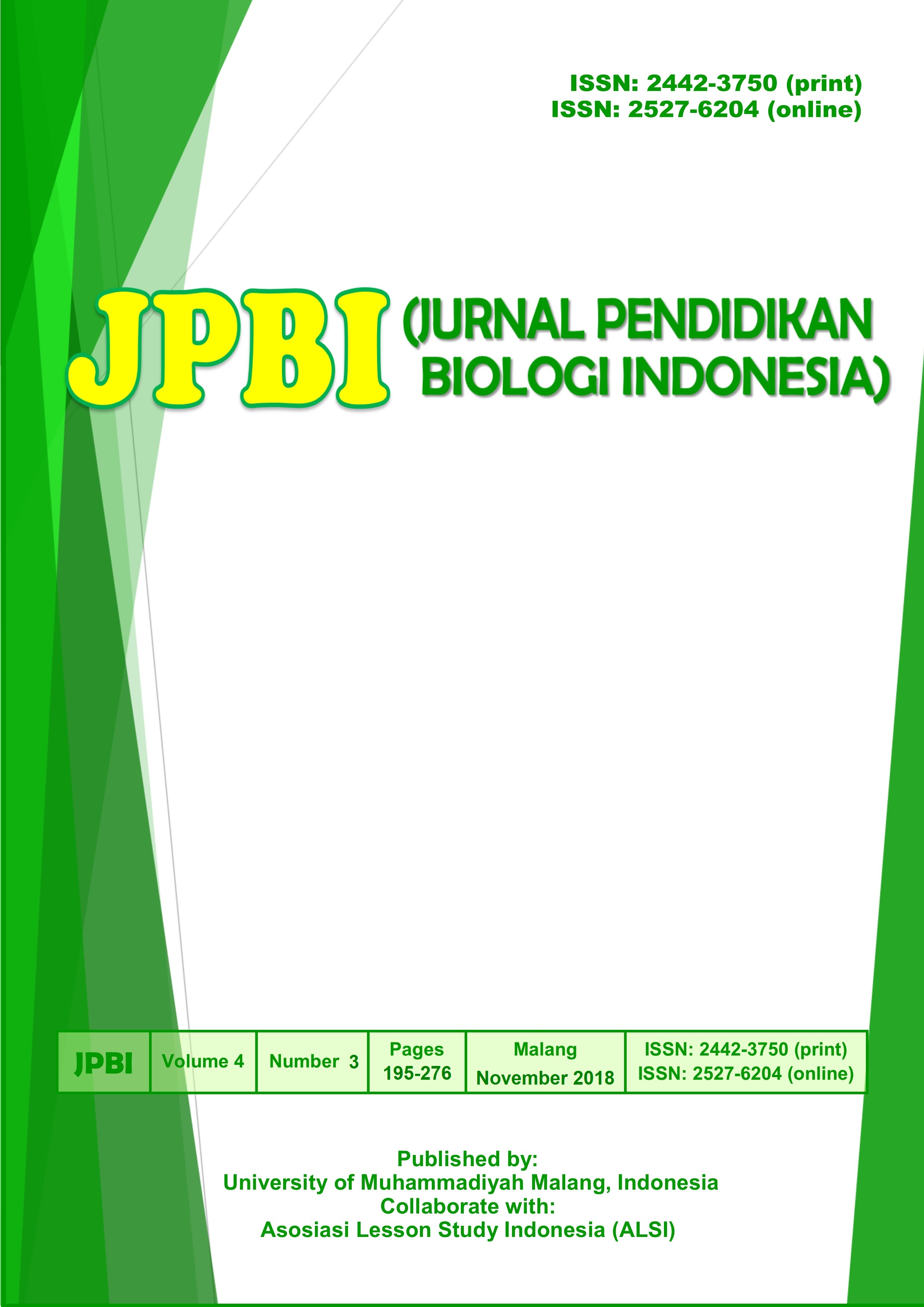The implementation of school-literacy-movement: Integrating scientific literacy, characters, and HOTS in science learning
DOI:
https://doi.org/10.22219/jpbi.v4i3.6876Keywords:
Characters, HOTS, scientific literacy, school-literacy-movementAbstract
This study aimed to examine the implementation of the School Literacy Movement (SLM) by observing its impacts toward the scientific literacy, characters, and HOTS of Grade VII Junior High School (JHS) students in Pekanbaru within the context of K-13. The survey was conducted with 45 natural science teachers on the basis that they have integrated K-13 into their teaching and learning. The data of SLM implementation was obtained from the teacher by means of questionnaires and observation which was conducted in science classes in three JHS in pollution and global warming topics. The results showed that 49.13% of activities were successfully implemented by SLM. The results showed that students’ scientific literacy in the three schools were 69.5%, 76.3%, and 75.2%. Meanwhile, the character values have reached 80.6%, 76.4%, 72.9%, and students’ HOTS values were 73.0%, 72.5%, and 73.3%. Based on the survey, it can be concluded that although the school has pioneered SLM, the strengthening of scientific literacy, characters, and HOTS has not been executed by all teachers who implement K-13 due to various obstacles need new policies to assess the execution of the SLM program by the local education department.
Downloads
References
Chiappetta, E. L., & Koballa, T. R. (2010). Thoughts and actions of beginning science teachers. In Science Instruction in the Middle and Secondary Schools: Developing Fundamental Knowledge and Skills (Seventh Ed, pp. 1–13). Houston: Pearson.
Derlina, D., & Srijayanti, P. (2016). Potret implementasi pendidikan karakter di SMP kecamatan patumbak sumatera utara. Jurnal Ilmiah Pendidikan Fisika Al-Biruni, 5(2), 141. https://doi.org/10.24042/jpifalbiruni.v5i2.114
Faradina, N. (2017). Pengaruh program gerakan literasi sekolah terhadap minat baca siswa di SD islam terpadu Muhammadiyah An-Najah Jatinganom Klaten. Jurnal Hanata Widya, 6(8), 60–69.
Husen, D. N. (2016). Peningkatan kemampuan berpikir kreatif siswa melalui penerapan model problem based learning. BIOEDUKASI, 3(2).
Istikomayanti, Y., Suwono, H., & Irawati, M. H. (2016). Pembelajaran eksperiensial group investigation (GI) sebagai upaya mengembangkan kemampuan literasi lingkungan siswa kelas IV MI. JPBI (Jurnal Pendidikan Biologi Indonesia)Jurnal Pendidikan Biologi Indonesia, 2(1), 57–71. https://doi.org/10.22219/JPBI.V2I1.3372.G3961
Kemendikbud. (2016, October). Gerakan literasi untuk tumbuhkan budaya literasi. Jendela Pendidikan Dan Kebudayaan, 04-21. Retrieved from https://jendela.kemdikbud.go.id/home/downloadfile/?name=EDISI_6_20161.pdf.
Khoiriyah, A. J., & Husamah, H. (2018). Problem-based learning: Creative thinking skills, problem-solving skills, and learning outcome of seventh grade students. JPBI (Jurnal Pendidikan Biologi Indonesia), 4(2), 151–160. https://doi.org/10.22219/jpbi.v4i2.5804
Lederman, N. G., Lederman, J. S., & Antink, A. (2013). Nature of science and scientific inquiry as contexts for the learning of science and achievement of scientific literacy. International Journal of Education in Mathematics Science and Technology (IJEMST), 1(3), 138–147. https://doi.org/10.18404/ijemst.19784
Mansyur, M., Rahamma, T., & Jeany Maria Fatima. (2013). Kemampuan literasi media visual siswa dan keberhasilan pembelajaran TIK di SMP Negeri 11 Pare-Pare. Jurnal Komunikasi KAREBA, 2(4), 379–385.
Maunah, B. (2014). Implementasi pendidikan karakter dalam pembentukan kepribadian holistik siswa. Jurnal Pendidikan Karakter, V(1), 90–101. https://doi.org/http://dx.doi.org/10.21831/jpk.v0i1.8615
Mitasari, Z., & Prasetiyo, N. A. (2016). Penerapan metode diskusi-presentasi dipadu analisis kritis artikel melalui lesson study untuk meningkatkan pemahaman konsep, kemampuan berpikir kritis, dan komunikasi. JURNAL BIOEDUKATIKA, 4(1), 11–14.
Presidential-Regulation. (2017). Peraturan Presiden (Perpres) Nomor: 87 Tahun 2017 tentang Penguatan Pendidikan Karakter.
Rahayuni, G. (2016). Hubungan keterampilan berpikir kritis dan literasi sains pada pembelajaran IPA terpadu dengan model PBM dan STM. Jurnal Penelitian Dan Pembelajaran IPA, 2(2), 131–146. https://doi.org/10.1016/j.phytochem.2008.01.027
Setyaningrum, Y. H. (2011). Optimalisasi penerapan pendidikan karakter di sekolah menengah berbasis keterampilan proses: Sebuah perspektif guru IPA-biologi. Jurnal Penelitian Dan Pemikiran Pendidikan, 1(1), 69–81.
Setyawan, D. (2017). Penerapan pembelajaran OIDDE pada matakuliah Zoologi Vertebrata untuk meningkatkan kemampuan berpikir kritis dan hasil belajar mahasiswa Pendidikan Biologi Universitas Muhammadiyah Malang. In Prosiding Seminar Nasional III Tahun 2017 “Biologi, Pembelajaran, dan Lingkungan Hidup Perspektif Interdisipliner” (pp. 196–203).
Suryawati, E., Hamzah, A., & Hayati, E. (2015). Pengembangan lembar kerja siswa biologi SMA berbasis pendekatan ilmiah untuk meningkatkan keterampilan berfikir siswa. Jurnal Pendidikan Biologi, 6(2), 91–99.
Wilsa, A. W., Susilowati, S. M. E., & Rahayu, E. S. (2017). Problem based learning berbasis socio-scientific issue untuk mengembangkan kemampuan berpikir kritis dan komunikasi siswa. Journal of Innovative Science Education, 6(1), 129–138.
Windyariani, S., & Sutisnawati, A. (2017). Pengembangan bahan ajar berbasis konteks dan kreativitas untuk melatihkan literasi sains siswa sekolah dasar. JURNAL BIOEDUKATIKA, 4(2), 19–25.
Downloads
Published
Issue
Section
License
Authors who publish with JPBI (Jurnal Pendidikan Biologi Indonesia) agree to the following terms:
- For all articles published in JPBI, copyright is retained by the authors. Authors give permission to the publisher to announce the work with conditions. When the manuscript is accepted for publication, the authors agree to automatic transfer of the publishing right to the publisher.
- Authors retain copyright and grant the journal right of first publication with the work simultaneously licensed under a Creative Commons Attribution-ShareAlike 4.0 International License that allows others to share the work with an acknowledgment of the work's authorship and initial publication in this journal.
- Authors are able to enter into separate, additional contractual arrangements for the non-exclusive distribution of the journal's published version of the work (e.g., post it to an institutional repository or publish it in a book), with an acknowledgment of its initial publication in this journal.
- Authors are permitted and encouraged to post their work online (e.g., in institutional repositories or on their website) prior to and during the submission process, as it can lead to productive exchanges, as well as earlier and greater citation of published work (See The Effect of Open Access).

This work is licensed under a Creative Commons Attribution-ShareAlike 4.0 International License.


















